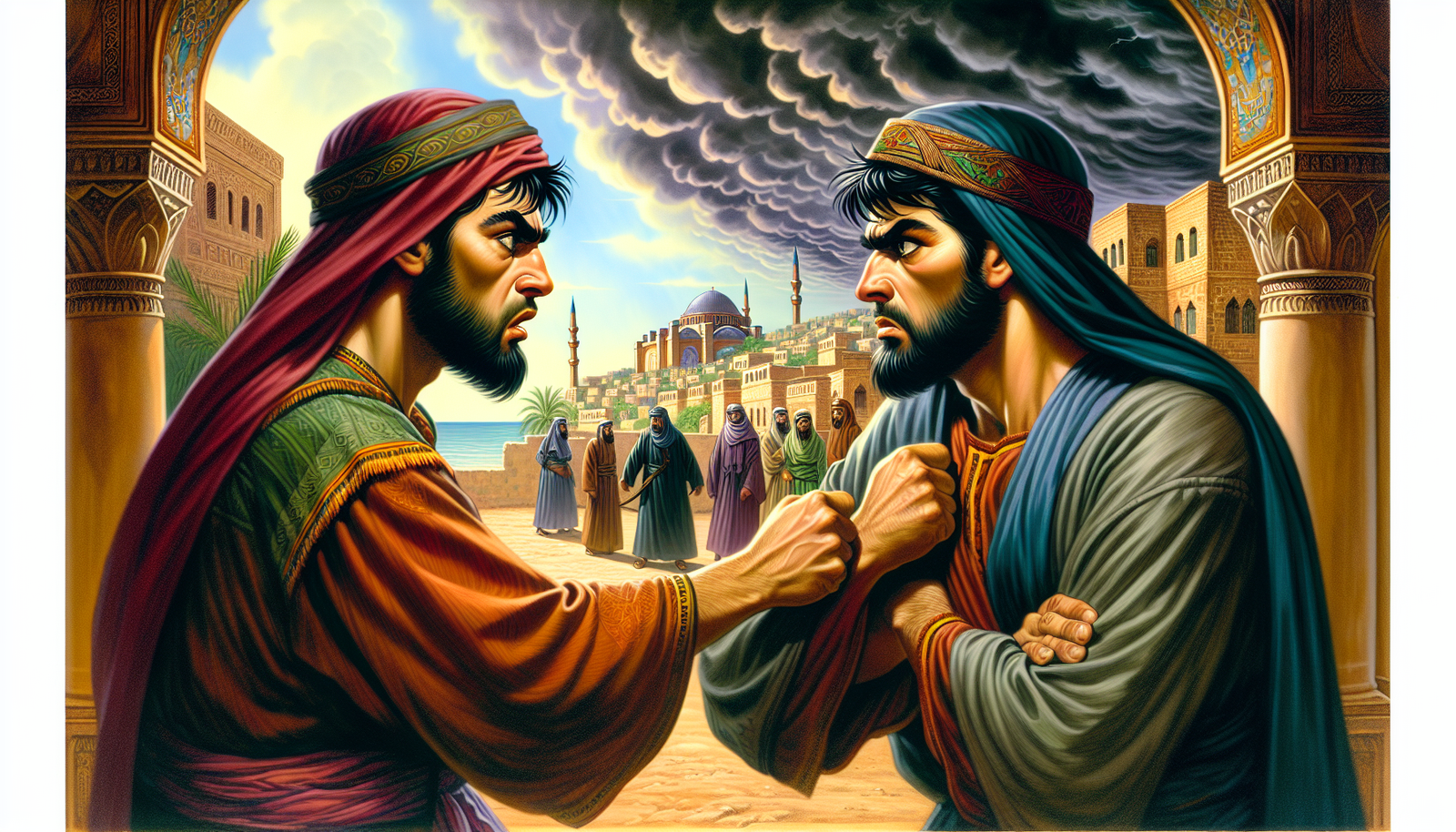John Mark and Paul started as partners in spreading the gospel, sharing a solid commitment to their mission. However, their relationship hit a rough patch when John Mark decided to leave, causing a serious disagreement between Paul and Barnabas.
This story delves into their conflict, how they eventually made peace, and the essential teachings on forgiveness and personal development that emerged from their experiences.
Key Takeaways
John Mark departed from Paul and Barnabas on their first missionary trip, causing a significant rift with Paul.
The disagreement over John Mark’s departure was so severe that Paul and Barnabas parted ways. Paul teamed up with Silas while Barnabas continued to support John Mark.
Over time, John Mark mended his relationship with Paul. He played a crucial role in the early church and even wrote the Gospel of Mark.
The First Missionary Journey
During their initial mission to spread the gospel, Paul and Barnabas set out on their first missionary journey, bringing along John Mark. Coming from a Christian family, this young man was crucial in supporting their efforts as they traveled across Cyprus and Perga. Despite facing many challenges that tested their resolve, they worked together and achieved early successes on this journey of faith.
John Mark’s Early Contributions

John Mark, also known as John called Mark, grew up deeply rooted in the Christian faith. His mother, Mary, was vital to the early church, using her home in Jerusalem as a gathering place for the apostles. This early exposure to the religious activities of his time profoundly influenced John Mark, setting the stage for his significant future contributions to the church.
As Barnabas’ nephew, John Mark had close ties to key figures in the emerging Christian community. He became essential during Paul and Barnabas’ first missionary journey, helping to spread the gospel. Yet, his journey was marked by unexpected changes and challenges ahead.
Departure from Perga in Pamphylia

John Mark’s choice to leave Paul and Barnabas in Perga of Pamphylia and return to Jerusalem had significant repercussions. His departure strained his relationship with Paul, and it is speculated that Sergius Paulus’s conversion may have influenced this decision.
This early exit from the mission work impacted the relationships among the missionaries. It set the stage for ongoing discord between Paul and Barnabas, eventually leading to serious conflict over their differing perspectives.
The Sharp Disagreement

The debate over whether to bring John Mark on another missionary journey created more than a minor disagreement. Paul and Barnabas were deeply divided. Paul felt that John Mark’s previous decision to leave them in Pamphylia made it unwise to include him again.
This disagreement reached a breaking point, leading to a decisive split. Both Paul and Barnabas concluded that parting ways was the only solution.
Paul’s Reluctance
Paul’s reluctance to include John Mark on the second missionary journey was fueled by a sense of betrayal from John Mark’s earlier departure at a critical time. The possibility of another abandonment loomed large for Paul, highlighting their ministry’s need for reliability and trust.
Given the serious nature of their mission, Paul’s cautious approach to selecting his companions was justified. Still troubled by the memory of being left previously, he decided it was wise not to involve John Mark in future missions. To alleviate such concerns, only Luke was considered a reliable partner fit to join him.
Barnabas’ Advocacy
Barnabas was ready to extend another opportunity to John Mark, exemplifying his conviction in the virtue of forgiveness and grace’s transformative capacity. His decision to stand by John Mark, potentially jeopardizing his missionary work, highlights Barnabas as a true beacon of encouragement.
Barnabas’s resolve to include John Mark on their journey indicates his dedication to the cultivation and rehabilitation of fellow Christians. Yet this choice also precipitated a parting with Paul, illustrating that even among earnest followers, profound disputes can occur.
The Second Missionary Journey
After experiencing a sharp disagreement, Paul and Barnabas decided to take separate paths for their missionary work. Despite the difficulty of this separation, it ultimately led to a broader spread of their ministries, showcasing God’s ability to utilize discord toward others. His purposes.
While Barnabas set off for Cyprus with John Mark as his companion, Paul selected Silas as his fellow worker in continuing the mission.
Paul Chose Silas

Commencing their travels through Syria and Cilicia, the apostles Paul and Silas made great efforts to promulgate the gospel and fortify the nascent church. Benefiting from Silas’s status as a Roman citizen, which eased their movements and evangelistic endeavors.
Their voyage was distinguished by notable accomplishments in founding and bolstering congregations within these territories. Such a stage of Paul’s ministry highlighted the critical need for flexibility and steadfastness in disseminating the gospel message.
Barnabas and John Mark’s Journey

Embarking on a voyage to Cyprus, Barnabas and John Mark strategically concentrated their mission work in areas already known. In doing so, they leveraged the relationships and groundwork established during their initial missionary expedition.
The endeavor in Cyprus encompassed the proclamation of the gospel and individual transformation. John Mark’s inclusion on this journey underscored Barnabas’s faith in granting second opportunities and the profound impact that grace can have on personal redemption.
Reconciliation and Later Life
The rift between John Mark and Paul was not the final chapter in their narrative. As time passed, they found reconciliation, with Paul recognizing and praising John Mark’s significant role and contributions to their ministry work.
Dear friend, this reunion is a potent testament to the idea that conflict can emerge as a source of fortified bonds and fresh starts.
Paul’s Commendation of John Mark
Paul praised John Mark in later epistles, encouraging acceptance of him and recognizing his vital contribution to the ministry. This shift reflects John Mark’s personal development and vindication.
Commendations from Paul found in epistles such as Colossians, and Philemon reveal a reconciliation between them, demonstrating an evolved mutual esteem. As Paul’s life drew close, he regarded John Mark as an esteemed colleague and a source of solace.
John Mark’s Role in the Early Church

John Mark, a key figure in the early church:
Wrote the Gospel of Mark
Maintained a tight bond with Apostle Peter, who affectionately called him ‘my son.’
Played a crucial role by recording Jesus’ teachings and life events
Including the Gospel of Mark in the New Testament underscores John Mark’s substantial influence on Christian theology and historical accounts. His transformation from abandoning his mission to becoming an esteemed writer illustrates that redemption can lead to profound contributions within church ministry.
Lessons from Their Story
The narrative of John Mark and Paul underscores the importance of grace and the capacity for development in the face of adversity. This tale illustrates how, despite past shortcomings, people can be redeemed to meaningful service through their journey.
Importance of Grace in Ministry
Guided by the Holy Spirit, Barnabas exemplified the crucial role of grace within his ministry. Despite previous setbacks, his forbearance and supportive attitude towards John Mark underscored the life-altering influence of grace—a principle deeply rooted in Jesus Christ’s teachings.
To effectively nurture and rehabilitate fellow followers of Christ, the presence of grace in one’s ministry is vital. Through his dealings with John Mark, Barnabas serves as a testament to our need to see past prior missteps and champion each other’s development and renewal on their spiritual journey.
Growth Through Conflict
Ultimately, the intense dispute between Paul and Barnabas expanded their missionary work by creating two separate teams that could reach a wider area. This situation demonstrates how gracefully managed conflicts can enhance effectiveness and contribute to individual development.
John Mark’s experience with confrontation and subsequent reconciliation highlights the constructive nature of disagreements, which can serve as occasions for education and strengthening bonds. His personal story is a compelling testament to how difficulties can catalyze evolution and change in one’s life.
Summary
John Mark’s experiences with Paul, ranging from their initial partnership to a period of strife and eventual reconciliation, provide meaningful insight into the dynamics of the early church and the transformative nature of grace. This narrative illustrates how disputes can catalyze personal development and underscores the value of offering forgiveness.
Contemplating their combined path should motivate us to incorporate grace into our own relationships and acknowledge that even disagreements can lead to progress. The tale of John Mark and Paul affirms redemption’s strength and its role in reshaping ministry practices.








